
Swahili, also known by its local name Kiswahili, is the native language of the Swahili people, who are found primarily in Tanzania, Kenya and Mozambique. It is a Bantu language, though Swahili has borrowed a number of words from foreign languages, particularly Arabic, but also words from Portuguese, English and German. Around forty percent of Swahili vocabulary consists of Arabic loanwords, including the name of the language. The loanwords date from the era of contact between Arab slave traders and the Bantu inhabitants of the east coast of Africa, which was also the time period when Swahili emerged as a lingua franca in the region. The number of Swahili speakers, be they native or second-language speakers, is estimated to be around 80 million.
General elections were held in Tanzania on 14 December 2005. Originally scheduled for 30 October, the elections were postponed due to the death of CHADEMA vice-presidential candidate Jumbe Mohamed Jumbe. The elections were the third since the country returned to multi-party rule in 1992. Incumbent President Benjamin Mkapa stepped down after two consecutive terms in accordance with the constitution. Elections for the Presidency of Zanzibar and its House of Representatives took place on 30 October, as scheduled.
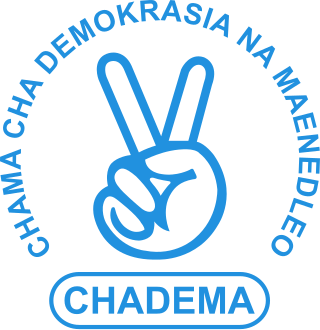
The Party for Democracy and Progress, commonly known as Chadema, is a center-right political party in Tanzania.
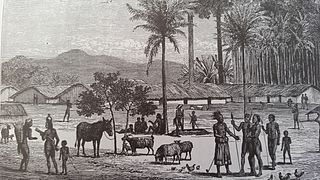
Manyema (WaManyema), are a powerful and, in the past, warlike Bantu people in the southeast of the Congo basin in Nyangwe (Kasongo) in Maniema, Democratic Republic of Congo and in the city of Kigoma, Kigoma region of Western Tanzania around the shores of Lake Tanganyika.
Gweno is a Bantu language spoken in the North Pare Mountains in the Kilimanjaro Region of Tanzania. The people known as the Gweno are a Chaga ethnic and linguistic group. Since the Chaga people are Bantu speakers, the adopted language contains dialects similar to that of the Kenyan language Kamba. Gweno shares about 54% to 56% of its vocabulary with other Chaga dialects and 46% with Taita dialects. However, a large percentage of its vocabulary is not seen in the other dialects. Also at the start of the 11th century, the Chaga people descended and migrated from the Bantu group in which they migrated to the foothills of mount Kilimanjaro. The Gweno language is today spoken mostly by older adults, with younger generations having shifted to Asu and Swahili. Ethnologue considers Gweno to be moribund; the language is not being passed down because children have not been exposed to Gweno since the 1970s. The generational shift from Gweno to either Asu or Swahili has certainly created shifts in dialect, however Gweno speakers do not see this as a threat.
Swahili literature is, generally speaking, literature written in the Swahili language, particularly by Swahili people of the East African coast and the neighboring islands. It may also refer to literature written by people who write in the Swahili language. It is an offshoot of the Bantu culture.

Islam is the most prominent religion on the semi-autonomous Zanzibar archipelago and could be considered the Islamic center in the United Republic of Tanzania. Around 99% of the population in the islands are Muslim, with two-thirds being Sunni Muslim and a minority Ibadi, Ismaili and Twelver Shia. Islam has a long presence on the islands, with archeological findings dating back to the 10th century, and has been an intrinsic part in shaping mercantile and maritime Swahili culture in Zanzibar as well as along the East African coast.
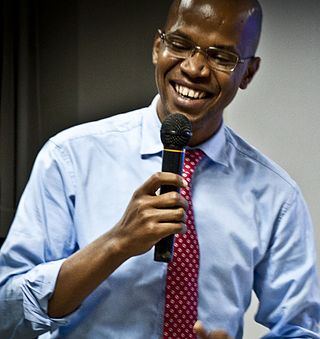
January Yusuf Makamba is a Tanzanian CCM politician and Member of Parliament for Bumbuli constituency since 2010. In December 2015, he was appointed as a Minister of State in the Vice President’s Office for Union Affairs and Environment.
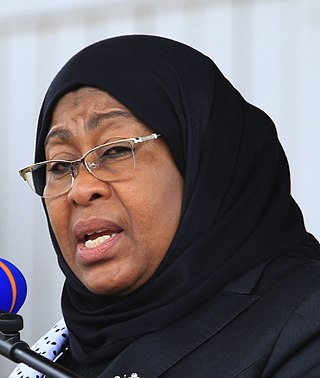
Samia Suluhu Hassan is a Tanzanian politician who has been serving since 19 March 2021 as the sixth president of Tanzania. She is a member of the ruling social-democrat Chama Cha Mapinduzi (CCM) party and the third female head of government of an East African Community (EAC) country. Upon the death in office of President John Magufuli, she was sworn in as president.

Nasibu Abdul Juma Issack, popularly known by his stage name Diamond Platnumz, is a Tanzanian bongo flava recording artist, dancer, philanthropist and a businessman of Ha heritage. He is the founder and CEO of WCB Wasafi Record Label, Wasafi Bet and Wasafi Media. Diamond has gained a massive following in East and Central Africa. He became the first Africa-based artist to reach a combined total of one billion views on YouTube.
James Daudi Lembeli is a Tanzanian politician who served as a Member of Parliament for Kahama constituency from 2005 to 2015 via the ruling Chama Cha Mapinduzi (CCM) party.
Donald Kevin Max was a Tanzanian CCM politician and Member of Parliament for Geita constituency from 2010 to his death in 2015.
Godfrey William Mgimwa is a Tanzanian CCM politician.
General elections were held in Tanzania on 25 October 2015. Voters elected the president, members of Parliament, and local government councillors. By convention, the election was held on the last Sunday of October and was supervised by the National Electoral Commission (NEC). Political campaigns commenced on 22 August and ceased a day before the polling day.

The Alliance for Change and Transparency, sometimes known as the ACT–Wazalendo, is the third-largest political party in Tanzania. It received its permanent registration in May 2014.
The Chama Cha Mapinduzi (CCM) presidential primaries, 2015 took place in July 2015 to determine CCM's nominee for the Presidency of Tanzania for the 2015 election. The Chama Cha Mapinduzi is the country's dominant ruling party, and the longest reigning ruling party in Africa.
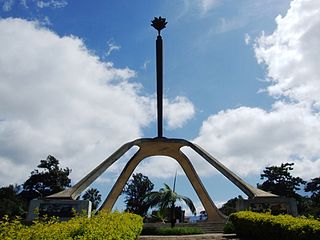
The Arusha Declaration Monument is a landmark monument and tourist attraction located in Kati ward in Arusha, Tanzania. It was unveiled in 1977 by the nation's ruling Chama Cha Mapinduzi (CCM) party to commemorate ten years of the Arusha Declaration. It is situated along Makongoro Road at the centre of the roundabout.
Halima Abdallah Bulembo is a District Commissioner for Muheza District, Tanga Region. Prior to her appointment, Halima Abdallah Bulembo served as a Special Seats Member of Parliament for Kagera Region in Tanzania. She was appointed to her seat in November 2015, making her the youngest female parliamentarian in the 11th parliament of Tanzania and was in office until October, 2020.

Sofia Kawawa was the founder of the Tanzania Women's Union (UWT). She was a member of the Tanganyika African National Union (TANU) party and later Chama Cha Mapinduzi (CCM).
Mkia wa Ng'ombe Ruins is protected historic site located inside Micheweni District of Pemba North Region in Tanzania. The settlement was established around the 15th CE and abandoned in the 16th century. There are ruins of a mosque, tombs and some stone buildings. The site is critically endangered to further erosion.









